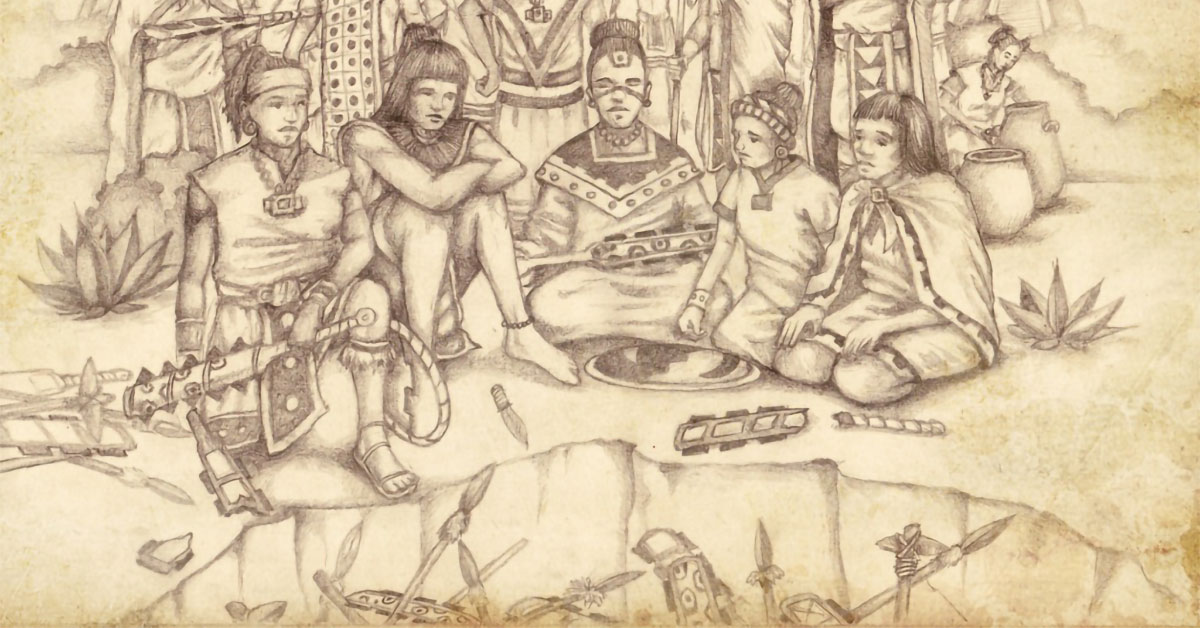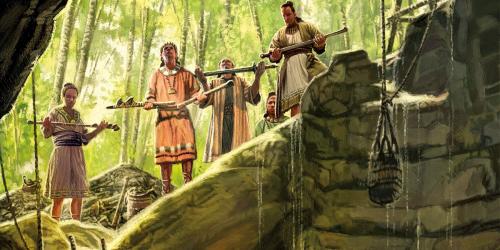You are here
Book of Mormon Central is in the process of migrating to our new Scripture Central website.
We ask for your patience during this transition. Over the coming weeks, all pages of bookofmormoncentral.org will be redirected to their corresponding page on scripturecentral.org, resulting in minimal disruption.
Come Follow Me 2020: Alma 23-29

Scripture Block
Alma 23–29
June 29–July 5. They “Never Did Fall Away”
KnoWhys
Recommended Resources
Learn about the Book of Mormon with verse by verse commentaries from renowned Book of Mormon scholars like John W. Welch and Brant A. Gardner in the ScripturePlus app. Read this week's KnoWhy connected with the Come Follow Me curriculum, and watch a video elucidating an insight in this week's scripture reading.
*NOTE*
This installment of John W. Welch notes contains some new research on Alma 29. This publication is the first time that anyone has noticed the use of "joy" 7x by Ammon in Alma 26, 7x by Mormon in Alma 27, and 7x by Alma in Alma 29. This may be one of the most amazing literary triple plays in ancient literature.
This installment also contains 2 downloadable images as a companion to your study. John W. Welch has laid out Alma 29 in poetic format, highlighting the repeated word patterns in Alma's soliloquy. See pages 657–661 for these charts, and an explanation of the word counts in Alma 29.
Reading Plan
Structure your personal scripture study by following a multimedia, day by day plan. Each day's assignment includes the required scripture passages from the Come Follow Me curriculum, as well as suggestions for additional resources to bring context and understanding to your study. If you are looking to dive deep into your study, skip down to "Additional Resources" for a selected bibliography of articles, books, and chapters on Alma 17–22.
Monday
- Scripture: Alma 23:1–18
- KnoWhy 131: Why Did Converted Lamanites Call Themselves Anti-Nephi-Lehies?
Tuesday
- Scripture: Alma 24:1–30
- KnoWhy 132: What is the Symbolism of the Stained Swords of the Anti-Nephi-Lehies?
Explore Further
- KnoWhy 360: Why Does God Sometimes Send Angels to Help People?
- KnoWhy 272: Where Can You Best Learn about God’s Plan of Salvation?
Wednesday
- Scripture: Alma 25:1–6
-
Quote: “In a somber aftermath, we learn of the terrible fate of the former priests and their sons.... When the Nephite force ambushed the Lamanite army, it both killed ‘almost all the seed of Amulon and his brethren, who were the priests of Noah,’ and drove the remainder deeper into the wilderness where a rift occurred among the Lamanite soldiers.... After an ensuing mutiny, termed a ‘contention in the wilderness,’ ‘the Lamanites’ began ‘to hunt’ and kill ‘the seed of Amulon and his brethren.’ In a mournful ending to this episode, the record sadly observes that ‘they are hunted at this day by the Lamanites.’”
Brown, S. Kent. “Marriage and Treaty in the Book of Mormon: The Case of the Abducted Lamanite Daughters.” Essay. In The Disciple as Scholar: Essays on Scripture and the Ancient World in Honor of Richard Lloyd Anderson, edited by Stephen David Ricks, Donald W. Parry, and Andrew H. Hedges, 110. Provo, UT: Foundation for Ancient Research and Mormon Studies at Brigham Young University, 2000. - Scripture: Alma 25:7–17
-
Quote: “The Anti-Nephi-Lehies obeyed the law of Moses, believing that it was a type of Christ's coming. (Alma 25:15.) Obeying the law strengthened their faith in Christ: [see Alma 25:15-16.] “This is one of the finest statements in the scriptures about the role of the law of Moses as a ‘type,’ a symbol or pattern, of the mission of Christ. The faithful Book of Mormon people observed the law of Moses while looking forward to the coming of Christ and while living gospel principles and ordinances. They knew that salvation did not come by the law of Moses but through Christ; yet the law strengthened their faith in Christ and taught them of him through the spirit of prophecy.”
Jackson, Kent P., and Darrell L. Matthews. “The Lamanite Converts Firm in the Faith of Christ.” Essay. In Studies in Scripture, Volume 7: 1 Nephi to Alma 29, edited by Kent P. Jackson, 335. Salt Lake City, UT: Deseret Book. Co., 1987.
Thursday
- Scripture: Alma 26:1–37
- KnoWhy 133: Why Did Ammon Borrow So Much from Tradition in Alma 26?
Friday
- Scripture: Alma 27:1–30
- KnoWhy 134: Why Was Jershon Called a Land of Inheritance?
Explore Further
Saturday
- Scripture: Alma 28:1–14
- KnoWhy 135: Why Did Fasting and Prayer Accompany Nephite Mourning?
Sunday
- Scripture: Alma 29:1–17
- KnoWhy 137: Why Was Alma’s Wish Sinful?
Explore Further
Additional Resources (Bibliography)
Alma 23
Boyce, Duane. “The Ammonites Were Not Pacifists.” Interpreter: A Journal of Mormon Scripture 20 (2016): 293–313.
Welch, John W., and Greg Welch. “From Nephi to Zarahemla: The Missionary Journeys of Mosiah's Sons.” In Charting the Book of Mormon: Visual Aids for Personal Study and Teaching. Provo, UT: Foundation for Ancient Research and Mormon Studies, 1999, chart 158.
Welch, John W., and Greg Welch. “Missionary Work.” In Charting the Book of Mormon: Visual Aids for Personal Study and Teaching. Provo, UT: Foundation for Ancient Research and Mormon Studies, 1999, chart 109.
Alma 23:3
Welch, John W., and Greg Welch. “A Comparison of Nephite Law Lists.” In Charting the Book of Mormon: Visual Aids for Personal Study and Teaching. Provo, UT: Foundation for Ancient Research and Mormon Studies, 1999, chart 127.
Alma 23:17
Book of Mormon Central. “Why Did Converted Lamanites Call Themselves Anti-Nephi-Lehies? (Alma 23:17).” KnoWhy 131 (June 28, 2016).
Alma 24
Boyce, Duane. “The Ammonites Were Not Pacifists.” Interpreter: A Journal of Mormon Scripture 20 (2016): 293–313.
Tvedtnes, John A. “’That They May Be Kept Bright.’” In The Most Correct Book: Insights from a Book of Mormon Scholar, 219–221. Salt Lake City: Cornerstone Publishing, 1999.
Welch, John W., and Greg Welch. “Wars in the Book of Mormon.” In Charting the Book of Mormon: Visual Aids for Personal Study and Teaching. Provo, UT: Foundation for Ancient Research and Mormon Studies, 1999, chart 136.
Welch, John W., and Greg Welch. “From Nephi to Zarahemla: The Missionary Journeys of Mosiah's Sons.” In Charting the Book of Mormon: Visual Aids for Personal Study and Teaching. Provo, UT: Foundation for Ancient Research and Mormon Studies, 1999, chart 158.
Alma 24:6–18
Boyce, Duane. “The Ammonites Were Not Pacifists.” Interpreter: A Journal of Mormon Scripture 20 (2016): 293–313.
Boyce, Duane. “Were the Ammonites Pacifists?” Journal of the Book of Mormon and Restoration Scripture 18, no. 1 (2009): 32–47.
Alma 24:12
Barney, Kevin L. and David Linn. “Let Us Stain Our Swords No More.” Insights: A Window on the Ancient World 22, no. 1 (2002): 2–3.
Book of Mormon Central. “What is the Symbolism of the Stained Swords of the Anti-Nephi-Lehies? (Alma 24:12).” KnoWhy 132 (June 29, 2016).
Roper, Matthew. “Swords and ‘Cimeters’ in the Book of Mormon.” Journal of Book of Mormon Studies 8, no. 1 (1999): 34–43, 77–78.
Alma 24:14
Book of Mormon Central. “Why Does God Sometimes Send Angels to Help People? (Alma 24:14).” KnoWhy 360 (September 1, 2017).
Book of Mormon Central. “Where Can You Best Learn about God’s Plan of Salvation? (Alma 24:14).” KnoWhy 272 (February 8, 2017).
Alma 25
Welch, John W., and Greg Welch. “Wars in the Book of Mormon.” In Charting the Book of Mormon: Visual Aids for Personal Study and Teaching. Provo, UT: Foundation for Ancient Research and Mormon Studies, 1999, chart 136.
Welch, John W., and Greg Welch. “From Nephi to Zarahemla: The Missionary Journeys of Mosiah's Sons.” In Charting the Book of Mormon: Visual Aids for Personal Study and Teaching. Provo, UT: Foundation for Ancient Research and Mormon Studies, 1999, chart 158.
Hardy, Grant R. “Mormon as Editor.” In Rediscovering the Book of Mormon, edited by John L. Sorenson and Melvin J. Thorne, 15–28. Provo, UT: FARMS , 1991.
Mackay, Thomas W. “Mormon as Editor: A Study in Colophons, Headers, and Source Indicators.” Journal of Book of Mormon Studies 2, no. 2 (1993): 90–109.
Alma 26
Welch, John W., and Greg Welch. “From Nephi to Zarahemla: The Missionary Journeys of Mosiah's Sons.” In Charting the Book of Mormon: Visual Aids for Personal Study and Teaching. Provo, UT: Foundation for Ancient Research and Mormon Studies, 1999, chart 158.
Alma 26:8
Book of Mormon Central. “Why Did Ammon Borrow So Much from Tradition in Alma 26? (Alma 26:8).” KnoWhy 133 (June 30, 2016).
Alma 26:17
Spackman, T. Benjamin. “The Israelite Roots of Atonement Terminology.” BYU Studies Quarterly 55, no. 1 (2016): 39–64.
Alma 27
Boyce, Duane. “The Ammonites Were Not Pacifists.” Interpreter: A Journal of Mormon Scripture 20 (2016): 293–313.
Welch, John W., and Greg Welch. “From Nephi to Zarahemla: The Missionary Journeys of Mosiah's Sons.” In Charting the Book of Mormon: Visual Aids for Personal Study and Teaching. Provo, UT: Foundation for Ancient Research and Mormon Studies, 1999, chart 158.
Welch, John W., and Greg Welch. “Twelve Journeys between the Cities of Nephi and Zarahemla.” In Charting the Book of Mormon: Visual Aids for Personal Study and Teaching. Provo, UT: Foundation for Ancient Research and Mormon Studies, 1999, chart 153.
Alma 27:4
Bowen, Matthew L. “’They Were Moved with Compassion’ (Alma 27:4; 53:13): Toponymic Wordplay on Zarahemla and Jershon.” Interpreter: A Journal of Mormon Scripture 18 (2016): 233–253.
Alma 27:22
Andersen, Joe V. Book of Mormon Objective Geographic Standard No. 2: Relationships of City Bountiful, Mulek, the East Sea, and Zarahemla., 2015.
Book of Mormon Central. “Why Was Jershon Called a Land of Inheritance? (Alma 27:22).” KnoWhy 134 (July 1, 2016).
Ricks, Stephen D. “A Nickname and a Slam Dunk: Notes on the Book of Mormon Names Zeezrom and Jershon.” Interpreter: A Journal of Mormon Scripture 8 (2014): 191–194.
(Jershon) Ricks, Stephen D., and John A. Tvedtnes. “Notes and Communications: The Hebrew Origin of Some Book of Mormon Place Names.” Journal of Book of Mormon Studies 6, no. 2 (1997): 255–259.
Ricks, Stephen D., and John A. Tvedtnes. “The Hebrew Origin of Three Book of Mormon Place-Names.” In Pressing Forward with the Book of Mormon: The FARMS Updates of the 1990s, edited by John W. Welch and Melvin J. Thorne, 88–92. Provo, UT: FARMS, 1999.
Alma 27:24
Book of Mormon Central. “Why were the People of Ammon Exempted from Military Duty? (Alma 27:24).” KnoWhy 274 (February 13, 2017).
Welch, John W. “Exemption from Military Duty.” In Reexploring the Book of Mormon, edited by John W. Welch, 189–192. Provo, UT/Salt Lake City: FARMS/Deseret Book, 1992.
Alma 27:27
Book of Mormon Central. “Why Is David Whitmer’s Witness of the Book of Mormon So Compelling? (Alma 27:27).” KnoWhy 395 (January 2, 2018).
Alma 28
Welch, John W., and Greg Welch. “Flashbacks in the Book of Alma.” In Charting the Book of Mormon: Visual Aids for Personal Study and Teaching. Provo, UT: Foundation for Ancient Research and Mormon Studies, 1999, chart 30.
Welch, John W., and Greg Welch. “From Nephi to Zarahemla: The Missionary Journeys of Mosiah's Sons.” In Charting the Book of Mormon: Visual Aids for Personal Study and Teaching. Provo, UT: Foundation for Ancient Research and Mormon Studies, 1999, chart 158.
Welch, John W., and Greg Welch. “Wars in the Book of Mormon.” In Charting the Book of Mormon: Visual Aids for Personal Study and Teaching. Provo, UT: Foundation for Ancient Research and Mormon Studies, 1999, chart 136.
Alma 28:6
Book of Mormon Central. “Why Did Fasting and Prayer Accompany Nephite Mourning? (Alma 28:6).” KnoWhy 135 (July 3, 2016).
Alma 29
Lindsay, Jeff. “Too Little or Too Much Like the Bible? A Novel Critique of the Book of Mormon Involving David and the Psalms.” Interpreter: A Journal of Mormon Scripture 29 (2018): 31–64.
Welch, John W., and Greg Welch. “The Speeches of Alma.” In Charting the Book of Mormon: Visual Aids for Personal Study and Teaching. Provo, UT: Foundation for Ancient Research and Mormon Studies, 1999, chart 60.
Alma 29:1–2
Book of Mormon Central. “Why Did Alma Wish to Speak “with the Trump of God”? (Alma 29:1).” KnoWhy 136 (July 5, 2016).
Peterson, Daniel C. “Compassion as the Heart of the Gospel.” Interpreter: A Journal of Latter-day Saint Faith and Scholarship 32 (2019): vii–xvi.
Peterson, Daniel C. “The Small Voice.” Interpreter: A Journal of Mormon Scripture 22 (2016): vii–xii.
Alma 29:3
Book of Mormon Central. “Why Was Alma’s Wish Sinful? (Alma 29:3).” KnoWhy 137 (July 6, 2016).
Alma 29:4
Book of Mormon Central. “Was Chiasmus Known to Ancient American Writers? (Alma 29:4).” KnoWhy 346 (July 31, 2017).
Alma 29:10
Bowen, Matthew L. “’He Did Go About Secretly’: Additional Thoughts on the Literary Use of Alma’s Name.” Interpreter: A Journal of Mormon Scripture 27 (2017): 197–212.
Calabro, David. “’Stretch Forth Thy Hand and Prophesy’: Hand Gestures in the Book of Mormon.” Journal of the Book of Mormon and Other Restoration Scripture 21, no. 1 (2012): 46–59.



